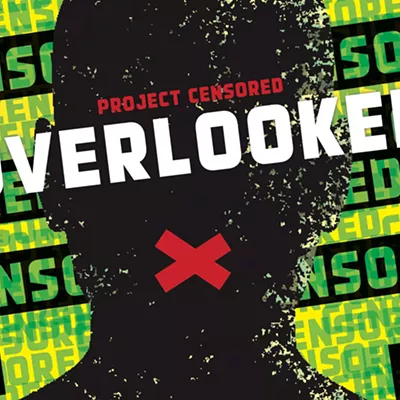No strings attached
[
{
"name": "Broadstreet - Instory",
"component": "25846487",
"insertPoint": "4",
"requiredCountToDisplay": "4"
},{
"name": "Broadstreet - Empower Local",
"component": "27852456",
"insertPoint": "8",
"requiredCountToDisplay": "8"
},{
"name": "Broadstreet - Instory",
"component": "25846487",
"insertPoint": "12",
"requiredCountToDisplay": "12"
},{
"name": "Broadstreet - Instory - 728x90 / 970x250",
"component": "27852677",
"insertPoint": "18",
"requiredCountToDisplay": "18"
},{
"name": "Broadstreet - Instory",
"component": "25846487",
"insertPoint": "5th",
"startingPoint": "23",
"requiredCountToDisplay": "24",
"maxInsertions": 100
}
]
by Ed Symkus
I'm sitting down to write this review about a half-hour after seeing the film -- an unusual circumstance for me because I almost always like to ruminate a bit before setting fingers to keyboard. But there's no need this time. How's this for an initial thought? This is an imaginative, complex, challenging, grandiose film with lots of heady ideas that are brilliantly played out. It's a visual masterpiece with an enthralling story, and stands as proof that Steven Spielberg's sense of wonder and his ability to translate it to the screen are both very much intact.
This is a film that will take your breath away.
In its simplest form, A.I. is a fairy tale, paying a great deal of homage to, and in fact retelling, the story of Pinocchio. Looking at it from a different perspective, it's about the enormous difficulty of truly giving love and getting it back in kind.
The story is set in the distant future, a time of post-environmental holocaust. Cities that were by the shore are now gone. Robots are, we're told, essential in the economic link of society. And they're very lifelike robots, practically impossible to tell apart from humans. But they don't eat or sleep or even breathe. In fact, a close look reveals that their skin is shinier than that of real people. An extended look would show that they don't blink.
They've served as workers, doing the things humans don't really like to or indeed can't do. But it's time for a change. Professor Hobby (William Hurt) is an inquisitive scientist, the man responsible for state-of-the-art "mechas," as they're called. He needs to know if his machines can be taught to love, but doesn't pay enough attention to a colleague who wonders if humans would ever be able to love a machine right back.
A couple of years later, the professor's newest invention is ready to go. For the first time, it's a child robot, made for love, made, hopefully, at least in the case of this story, to bring love back into the home of Monica and Henry (Frances O'Connor and Sam Robards). The couple has all but given up hope that their human son will come out of the deep freeze he was put in when an incurable disease ravaged him.
After much soul-searching, Monica finally says yes to Henry's idea of going through with this, of bringing a machine home to replace their boy, of attempting to live with and maybe even love David (Haley Joel Osment) while never forgetting Martin (Jake Thomas).
Things at home are at first a little tough, even a little funny. But David is treated as a toy, even though almost from the time David walks through the door of his new home, he desperately craves love.
The introduction of another character at this point -- a teddy bear named Teddy, who walks and talks and thinks and serves as a link or maybe a divide -- seems at first to be a cloying Spielberg kind of thing. But Teddy is never presented as a "cute pal," and adds quite a bit in moving the story forward. It's also at this point that the film takes the first of many dark turns, much more of it centering on the fact that this experiment in this particular home can never work. A heartbreaking scene has Monica dropping David off in the woods, with Teddy as a companion, and tearfully telling him he can never return home.
Yet even as this teary scene is being played out, a different one, with a flavor and visual style that's galaxies apart from the suburban one the action has so far taken place in, is unleashed. It's the gritty urban side of what the world has turned into, and we meet up with Gigolo Joe (Jude Law), an adult mecha who gets through life by, as his name suggests, making himself sexually available to women -- human women -- who wonder what it's like to do it with a robot.
Boy mecha and man mecha eventually meet, and man mecha attempts to help boy mecha realize his dream. And here is where the Pinocchio part comes in. David is convinced that if he could become a real boy, his mom would love him and take him back.
Spielberg turns the rest of the film into a dreamlike adventure, in which angry humans hunt down and destroy robots, in which David is convinced there is a Blue Fairy (just read Pinocchio), in which there's a voyage to "the lost city in the sea at the end of the world." It's a film loaded with startling visual effects, with an inordinate amount -- for Spielberg -- of close-ups, with excellent performances (Osment never blinks once), with cerebral moodiness and with heart. There's a bittersweet ending, but one that comes only after providing some wondrous entertainment.
I'm sitting down to write this review about a half-hour after seeing the film -- an unusual circumstance for me because I almost always like to ruminate a bit before setting fingers to keyboard. But there's no need this time. How's this for an initial thought? This is an imaginative, complex, challenging, grandiose film with lots of heady ideas that are brilliantly played out. It's a visual masterpiece with an enthralling story, and stands as proof that Steven Spielberg's sense of wonder and his ability to translate it to the screen are both very much intact.
This is a film that will take your breath away.
In its simplest form, A.I. is a fairy tale, paying a great deal of homage to, and in fact retelling, the story of Pinocchio. Looking at it from a different perspective, it's about the enormous difficulty of truly giving love and getting it back in kind.
The story is set in the distant future, a time of post-environmental holocaust. Cities that were by the shore are now gone. Robots are, we're told, essential in the economic link of society. And they're very lifelike robots, practically impossible to tell apart from humans. But they don't eat or sleep or even breathe. In fact, a close look reveals that their skin is shinier than that of real people. An extended look would show that they don't blink.
They've served as workers, doing the things humans don't really like to or indeed can't do. But it's time for a change. Professor Hobby (William Hurt) is an inquisitive scientist, the man responsible for state-of-the-art "mechas," as they're called. He needs to know if his machines can be taught to love, but doesn't pay enough attention to a colleague who wonders if humans would ever be able to love a machine right back.
A couple of years later, the professor's newest invention is ready to go. For the first time, it's a child robot, made for love, made, hopefully, at least in the case of this story, to bring love back into the home of Monica and Henry (Frances O'Connor and Sam Robards). The couple has all but given up hope that their human son will come out of the deep freeze he was put in when an incurable disease ravaged him.
After much soul-searching, Monica finally says yes to Henry's idea of going through with this, of bringing a machine home to replace their boy, of attempting to live with and maybe even love David (Haley Joel Osment) while never forgetting Martin (Jake Thomas).
Things at home are at first a little tough, even a little funny. But David is treated as a toy, even though almost from the time David walks through the door of his new home, he desperately craves love.
The introduction of another character at this point -- a teddy bear named Teddy, who walks and talks and thinks and serves as a link or maybe a divide -- seems at first to be a cloying Spielberg kind of thing. But Teddy is never presented as a "cute pal," and adds quite a bit in moving the story forward. It's also at this point that the film takes the first of many dark turns, much more of it centering on the fact that this experiment in this particular home can never work. A heartbreaking scene has Monica dropping David off in the woods, with Teddy as a companion, and tearfully telling him he can never return home.
Yet even as this teary scene is being played out, a different one, with a flavor and visual style that's galaxies apart from the suburban one the action has so far taken place in, is unleashed. It's the gritty urban side of what the world has turned into, and we meet up with Gigolo Joe (Jude Law), an adult mecha who gets through life by, as his name suggests, making himself sexually available to women -- human women -- who wonder what it's like to do it with a robot.
Boy mecha and man mecha eventually meet, and man mecha attempts to help boy mecha realize his dream. And here is where the Pinocchio part comes in. David is convinced that if he could become a real boy, his mom would love him and take him back.
Spielberg turns the rest of the film into a dreamlike adventure, in which angry humans hunt down and destroy robots, in which David is convinced there is a Blue Fairy (just read Pinocchio), in which there's a voyage to "the lost city in the sea at the end of the world." It's a film loaded with startling visual effects, with an inordinate amount -- for Spielberg -- of close-ups, with excellent performances (Osment never blinks once), with cerebral moodiness and with heart. There's a bittersweet ending, but one that comes only after providing some wondrous entertainment.
















